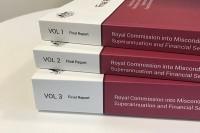APRA Insight 2020 Issue One

A message from APRA Deputy Chair John Lonsdale
Welcome to the first edition of APRA Insight for 2020.
Features

Twelve months on: APRA's progress on the Royal Commission recommendations
Twelve months on is a timely milestone to reflect on the impact of the Royal Commission; not only on Australia’s financial system and those who interact with it, but also on how APRA has, and continues, to effect change.

APRA’s evolving approach to supervising risk culture
APRA is employing a broader range of supervisory tools and continues to incorporate a range of new practices within its own supervision philosophy, including surveys, interviews and focus groups, case studies and self-assessments.

APRA and ASIC: a new era in cooperation
APRA and ASIC’s relationship has grown even tighter to better address the types of misconduct, poor performance and weak accountability that were raised during the financial services Royal Commission.

APRA’s 2020 Graduate Program
Offering placements in the Sydney, Melbourne and Brisbane offices, our 18-month program provides three six-month rotations across APRA’s frontline supervision, policy and advice, and cross-industry insights and data divisions.

Democratising data: APRA’s new approach to quarterly reporting
APRA has launched a series of consultations aimed at substantially increasing the amount of data published in the authorised deposit-taking institution, general insurance and life insurance sectors.
APRA explains

Capital explained
What exactly is capital, and how does it contribute to financial strength?

Data find: Capital resilience in Australia’s General Insurance industry
The biggest test of resilience for general insurers often comes in the aftermath of a major natural disaster, such as this summer’s bushfires, floods and hailstorms.
On the horizon
APRA has now completed the final testing phase of the Supervision Risk and Intensity (SRI) Model slated to replace its existing risk rating system, known as PAIRS and SOARS. The SRI Model is planned for roll-out across the financial sector during FY20/21. APRA will shortly begin industry engagement on how the new model works, its expected impact on regulated entities and plans for implementation from April 2020. APRA also expects to publish the detail and mechanics underpinning the SRI model, together with its revised Supervision Philosophy and supervision approach, in June 2020.
In the second quarter of 2020, APRA will release a second round consultation package on offshore reinsurers and the review of Prudential Standard LPS 117 Capital Adequacy: Asset Concentration Risk Charge. APRA received a number of submissions from stakeholders responding to the first round of consultation. These submissions contained a diverse set of views and have helped to inform the development of a more detailed set of policy proposals and a draft standard.
APRA is also in the process of finalising its response to a consultation on proposed changes to Prudential Standard SPS 250 Insurance in Superannuation (SPS 250), which commenced last November. The proposed revisions are designed to improve member outcomes, and include enhancements identified from APRA’s post-implementation review of the superannuation prudential framework, and also address recommendations from the financial services Royal Commission. APRA expects to release both a finalised SPS 250 and commence consultation on a revised, Prudential Practice Guide SPG 250 Insurance in Superannuation (SPG 250) by mid-2020.
Finally, submissions are closing soon on APRA’s proposed revisions to the capital framework for private health insurance, which commenced last December. APRA invites all interested stakeholders to provide their views to inform the next stage of the review which will include the development of draft standards. The consultation closes on 27 March.
The Australian Prudential Regulation Authority (APRA) is the prudential regulator of the financial services industry. It oversees banks, mutuals, general insurance and reinsurance companies, life insurance, private health insurers, friendly societies, and most members of the superannuation industry. APRA currently supervises institutions holding around $9.8 trillion in assets for Australian depositors, policyholders and superannuation fund members.